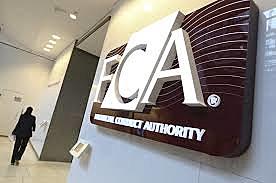
The FCA asks 'are we skewing the advice market?'
Christmas Eve is always a great day for burying bad news. Most journalists are back at home with their families in the country and Westminster’s Bien Pensant are busy draping the Christmas lights around their villas in Tuscany.
One journalist still at her desk was Rachel Mortimer at Financial Adviser. She happened upon her story deep within the intentionally oblique FCA Board Minutes. In amongst the blizzard of accepted reports and approved sub-committee panels, there was a note on FAMR and RDR.
Her interest piqued, Rachel contacted the FCA’s Nisha Arora and asked whether the FCA is skewing the advice market.
The response would suggest that the FCA is both skewing and screwing the advice market. The FCA could not understand why new advice models (Trans: Robo Advice) were not being developed.
It also suggested that the actions of “the FCA might be driving too many people to go out and seek advice” – Heaven Forefend! Note that people seeking advice is, as far as the FCA are concerned, seen as being a bad thing.
But there is a truth here. When Pension Freedoms were announced, the Chancellor declared that “hardworking people can be trusted to look after their savings”. Behind the scenes, both the FCA and the ruling Labour Party decided they couldn’t. Instead, they told those hardworking people that they had to have advice before they could move their money. This put advisers in a place they didn’t want to be in, and saddled the clients with costs they were not willing to pay. More importantly, thanks to the way FOS looks at this part of the market, it converted us from advisers to guarantors.
New Labour may have been and gone, but we still have the will of the elected Government being compromised by unelected quangocrats delivering the policy of the opposition party that created it in the first place.
It is not the only example. The Government’s Apprenticeship Scheme is currently not available to small adviser companies. The FCA regards itself as the consumer’s saviour – both from Government policy and a wicked industry.
We, the common people, exist to be nudged to their will. The FCA is still the favourite child of the “We Know Best” movement that has dominated the political scene for over two decades. But change is on the way. For the last three years, this movement has been fighting a rear-guard action against the common people. The EU and its allies have done everything in their power to void the referendum result and avoid Brexit.
But 2020 is the year these pigeons are coming home to roost. With the UK electorate delivering an 82-majority government, the EU is now in full reverse gear. President of the European Commission Ursula Gertrud von der Leyen is visiting Number 10. No more of the UK’s PM being forced to go to Brussels for another round of the ritual embarrassment by unelected civil servants.
Boris Johnston’s question is how he is going to use his embarrassment of riches. He has an advantage which is much bigger than the sum of 82, and it is not just numerical. Before the election he was unable to trust 40 of his own MPs who were Remainers. Some left the party before the election, more were banned from standing and others retired.
But that still leaves the civil service and quangos who will attempt to create a world in which everything remains the same. They will insist on matching EU regulations, even though we are no longer attached. Boris needs to have plans to create a de-regulation unit which will remove all unnecessary regulations. A unit that is granted real power in the face of a civil service determined to maintain the status quo in their favour.
So, what should the FCA do in the light of this new Real Politick? It is interesting that the FCA Board minutes that attracted the attentions of Rachel Mortimer suggested that they will look at other markets for clues on how best to deal with change. Perhaps they would do better to ask their own market and have the modesty to listen.
Allow me to (modestly) offer the FCA some basic homegrown tenets:
1) Drop your anti-commerce approach. The FCA appears to hate every aspect of commercial life. How many other businesses have their promotion so heavily restricted? How many are not allowed to go to court to settle disputes? How many have all the aspects of their hiring and firing controlled by a third party? How many markets face 20% regulatory costs? Since when was profit a dirty world? The current approach is to invent a fantasy market which isn’t a market at all. It is time to return to the practical world.
2. Move from the known to the unknown. First, we had “simplified advice” then Robo Advice. One never got off the ground. Robo-Advice, has flown like the Spruce Goose. Maybe the FCA should have started with the known, what works and what the public wants – which is good, old fashioned, expert advice. Instead, they put all their chips on Robo-advice which has failed spectacularly. Instead of running around the world looking for new unicorns, the FCA should concentrate on making advice more affordable and more available rather than create the fantasy world that they would like to rule over and control. This may require it to take actions against its own vested interest but that would be a pleasant change.
3. The FCA needs to stop dreaming about creating a National Wealth Service. The current government is not going to start spending taxpayer’s money on providing advice. So, the only solutions left open are commercial and if there is to be a commercial solution, it must be commercially viable and allowed to make money. Robo Advice has failed for the simple reason that it cannot make money. Ask Nutmeg. Losing £19m on a turnover of £7m isn’t hardly going to start the revolution the regulator wanted.
4. The FCA has a deeply embedded anti-commerce attitude. It needs to change.We need certainty, not need sandpits. When new challenges arise, the regulator must offer a pathway on how to deal with the issue and stick to it. Not stand aside for a decade before deciding what is politically expedient. The big scandals, such LIBOR, PPI and Pensions, have all been the result of Government policy impacting on financial services. Such changes should be discussed and planned before they happen. Established businesses must be policed and timely actions must be taken, whether it be P2P lending, Connaught, or UCIS. The dangers were obvious to everyone, yet nothing was done to prevent them happening.
5. Businesses need certainty – and so do PI insurers. In the new world, FOS needs profound change. Some clown with a 2.3 degree in Social Engineering is not qualified to pontificate on pension advice from a qualified adviser. It’s stating the obvious and yet the Regulator is still letting it happen.
6. Advice must have a future which is worth investing in. Thanks to FOS, the current offering to new entrants is essentially “Join our profession and we will give you an illusion of wealth until FOS decides when it will evaporate – maybe even after you retire”. The offering to investors in advice businesses is much the same. It is not acceptable to ask investors to invest in advice while preparing for FOS to reverse accepted norms at any time they see fit.
7. Finally, there must be proper accountability. We cannot have the current backdoor influence that banks and others can inject via the Treasury. The public cannot understand why those senior executives responsible for Equitable Life, the 2007 banking collapse or the LIBOR scandal have never been charged. The reason why charges have never been laid against them is because their defence would be that Ministers, civil servants and company executives knew and approved of their actions.
Change is in the air One story that Financial Adviser’s Rachel Mortimer has not picked up on (yet) is our decision to change our name. ‘Libertatem’ was decided upon at the outset as the moniker for our fledgling trade association as it was striking, different, memorable and avoided the usual array of alphabet soup that is spread across our industry.
With PIMFA taking over and effectively killing off APFA as a voice for impartial advisers, the path was clear to think again about ‘Libertatem’. The general consensus amongst many advisers and journalists was that it was perhaps a little too fancy. And so, after four years of both explaining and defending the name, we have decided to rebrand the organisation and revisit an old friend – The Impartial Advisers Association (IFAA) which many of you may remember was the name of the industry’s biggest and most successful trade association in the 1990s. The Impartial Financial Advisers Association is fighting for a cleaner and more honest regulatory system. The time is ripe for change. Brexit and a conscious uncoupling from Europe provides us all with an ideal opportunity to help shape the system that binds us. Join us now and have your say.
To join the IFAA and our growing membership, simply click on the link below. Fees can be paid monthly or annually and start at just £20 per month.Heading

